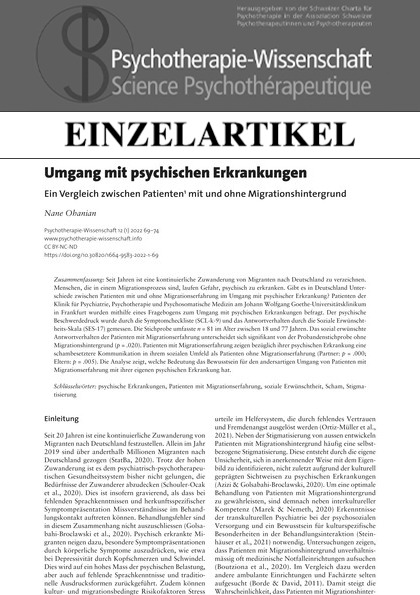Dealing with mental illness
A comparison between patients with and without a migration background
DOI:
https://doi.org/10.30820/1664-9583-2022-1-69Keywords:
mental illness, patients with migration experience, social desirability, shame, stigmaAbstract
There has been a continuous immigration of migrants to Germany for years. People who are in a process of migration are at risk of mental illness. Are there differences between patients with or without migration background in dealing with mental illness? Patients of the Department of Psychiatry, Psychotherapy and Psychosomatic Medicine at the Johann Wolfgang Goethe University Hospital in Frankfurt were interviewed with the help of a questionnaire on how they deal with mental illness. Psychological distress was measured by the Symptom Checklist (SCL-k-9) and response behavior by the Social Desirability Scale (SES-17). The sample included n = 81 aged between 18 and 77 years. The socially desired response behaviour of patients with migration experience differs significantly from the sample without migration experience (p = .020). Patients with migration experience show a more shameful communication regarding their mental illness in their social environment than patients without migration experience (partner: p = .000; parents: p = .005). The analysis shows the importance of awareness of the different way patients with migration experience deal with their own mental illness.
Downloads
How to Cite
Ohanian, N. (2022). Dealing with mental illness: A comparison between patients with and without a migration background. Psychotherapie-Wissenschaft, 12(1), 69–74. https://doi.org/10.30820/1664-9583-2022-1-69
Issue
Section
Original Work
License

This work is licensed under a Creative Commons Attribution-NonCommercial-NoDerivatives 3.0 Unported License.
This journal provides open access to its content in accordance with the basic premise that the free public availability of research benefits the exchange of knowledge throughout the world.
Authors wishing to publish in this journal agree to the following:
- The author/s retain/s the copyrights and consent/s to initial publication of the work in the journal under a Creative Commons Attribution licence, which allows third parties to use the work by citing the name/s of the author/s and this journal as initial publisher (in accordance with the Creative Commons Attribution-NonCommercial-NoDerivs 3.0 DE-Licence).
- The author/s can enter into additional contracts for the non-exclusive distribution (e.g. publish in a collection or book) of the version published in the journal, if the journal is cited as initial publisher.


